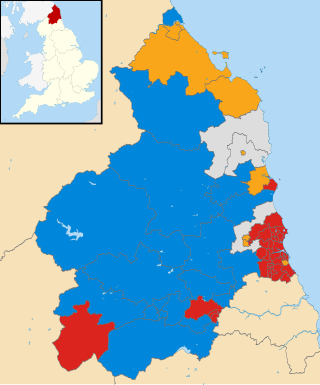
Northumberland is a ceremonial county in North East England, bordering Scotland. It is bordered by the Scottish Borders to the north, the North Sea to the east, Tyne and Wear and County Durham to the south, and Cumbria to the west. The town of Blyth is the largest settlement.

Morpeth is a historic market town in Northumberland, England, lying on the River Wansbeck. Nearby towns include Ashington and Bedlington. In the 2011 census, the population of Morpeth was given as 14,017, up from 13,833 in the 2001 census. The earliest evidence of settlement is believed to be from the Neolithic period, and some Roman artifacts have also been found.
Northumberland County Council elections are held every four years. Northumberland County Council is the local authority for the unitary authority of Northumberland in England. Since the last boundary changes in 2013, 67 councillors have been elected from 66 wards.
Blyth Valley Borough Council elections were generally held every four years between the council's creation in 1974 and its abolition in 2009. Blyth Valley was a non-metropolitan district in Northumberland, England. The council was abolished and its functions transferred to Northumberland County Council with effect from 1 April 2009.

Northumberland County Council is the local authority for the non-metropolitan county of Northumberland in North East England. Since 2009 it has been a unitary authority, having also taken over district-level functions when the county's districts were abolished.
Elections to Tynedale District Council were held for the final time on 3 May 2007. The whole council was up for election and the Conservative Party kept overall control of the council. The council was abolished in 2009 when Northumberland County Council became a unitary authority.

The 2008 United Kingdom local elections were held on 1 May 2008. These elections took place in 137 English Local Authorities and all Welsh Councils.

Local elections were held in the United Kingdom in May 1981.

Elections to Northumberland County Council were held on 2 May 2013. The full council was up for election, with each successful candidate serving a four-year term of office, expiring in 2017.

Local elections to Northumberland County Council, a county council in the north east of England, were held on 1 May 2008, resulting in a council with no overall control and with Liberal Democrat members forming the largest political group on the new unitary authority Council.

Local elections to Northumberland County Council, a county council in the north east of England, were held on 5 May 2005, resulting in a council with Labour members forming a majority.

Local elections to Northumberland County Council, a county council in the north east of England, were held on 7 June 2001. It was the first election to be held under new ward boundaries that increased the number of seats from 66 to 67. The Labour Party retained overall control of the council.

Local elections to Northumberland County Council, a county council in the north east of England, were held on 1 May 1997, resulting in a council with Labour members forming a majority.

An election for the Northumberland County Council took place on 4 May 2017 as part of the 2017 local elections in the United Kingdom. All 67 councillors were elected from 66 electoral divisions which returned either one or two county councillors each by first-past-the-post voting for a four-year term of office.

Local elections to Northumberland County Council, a county council in the north east of England, were held on 6 May 1993, resulting in a council with Labour members forming a majority.
Local elections to Northumberland County Council, a county council in the north east of England, were held on 12 April 1973, resulting in a council with no party forming a majority.
Local elections to Northumberland County Council, a county council in the north east of England, were held on 5 May 1977, resulting in a council with no party forming a majority.

Local elections to Northumberland County Council, a county council in the north east of England, were held on 2 May 1985. The Labour Party lost overall control of the council, which fell under no overall control.

Local elections to Northumberland County Council, a county council in the north east of England, were held on 4 May 1989, resulting in a council with Labour members forming a majority.

An election for the Northumberland County Council took place on 6 May 2021 as part of the 2021 local elections in the United Kingdom. All 67 councillors were elected from 66 electoral divisions which returned either one or two county councillors each by first-past-the-post voting for a four-year term of office.















